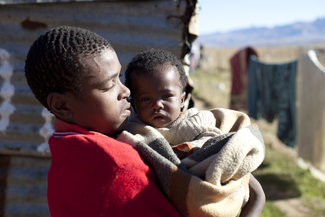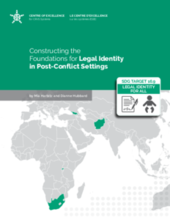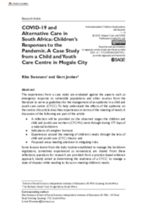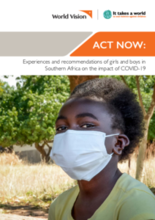

Displaying 111 - 120 of 576
This paper aims to contribute to the achievement of Target 16.9 under Sustainable Development Goal 16 by analyzing the role of the civil register and the legal underpinnings for identity in four countries: Afghanistan, Georgia, Rwanda, and South Africa. It describes institutional and operational models in each country that support universal registration of births, deaths, and other vital events.
This study evaluates the experiences from a case study against aspects such as emergency response to vulnerable populations and other sources from the literature to serve as guidelines for the management of an epidemic in a child and youth care centre (CYCC). To help understand the effects of the epidemic on the centre, this article describes experiences in terms of the meeting of needs.
This qualitative study employed individual interviews to explore the emotional experiences of 15 adolescents placed in foster care.
By drawing on the experiences of parents, advocates, NGOs, and public officials, this side event invited discussion on how, through strengthening families and tools for prevention, societies can reduce the number of children being institutionalized. During the event, a panel of experts from the Republic of Moldova, South Africa, Burkina Faso, Vietnam, and the United States explored their experiences around efforts to empower parents and keep children with disabilities with their families.
By drawing on the experiences of parents, advocates, NGOs, and public officials, this side event will invite discussion on how through strengthening families and tools for prevention, societies can reduce the number of children being institutionalized.
In South Africa, large increases in early adult mortality during the 1990s and early 2000s have reversed since public HIV treatment rollout in 2004. In a rural population in KwaZulu-Natal, the authors of this study investigated trends in parental mortality and orphanhood from 2000–2014.
This publication presents the voices of nearly 200 children and young people from across the Southern Africa region who shared their experiences on how COVID-19 continues to have an impact on their lives.
This study provides evidence from an evaluation of a bespoke family strengthening intervention for Child Support Grant beneficiaries in 10 urban communities in Johannesburg, South Africa.
This paper aims to describe the experiences of youth preparing to age out of cluster foster care in South Africa.
This article interrogates concerns regarding the South African government's strict lockdown and related legislation in response to the COVID-19 pandemic and the beliefs that it advanced children’s vulnerability to abuse and neglect.




